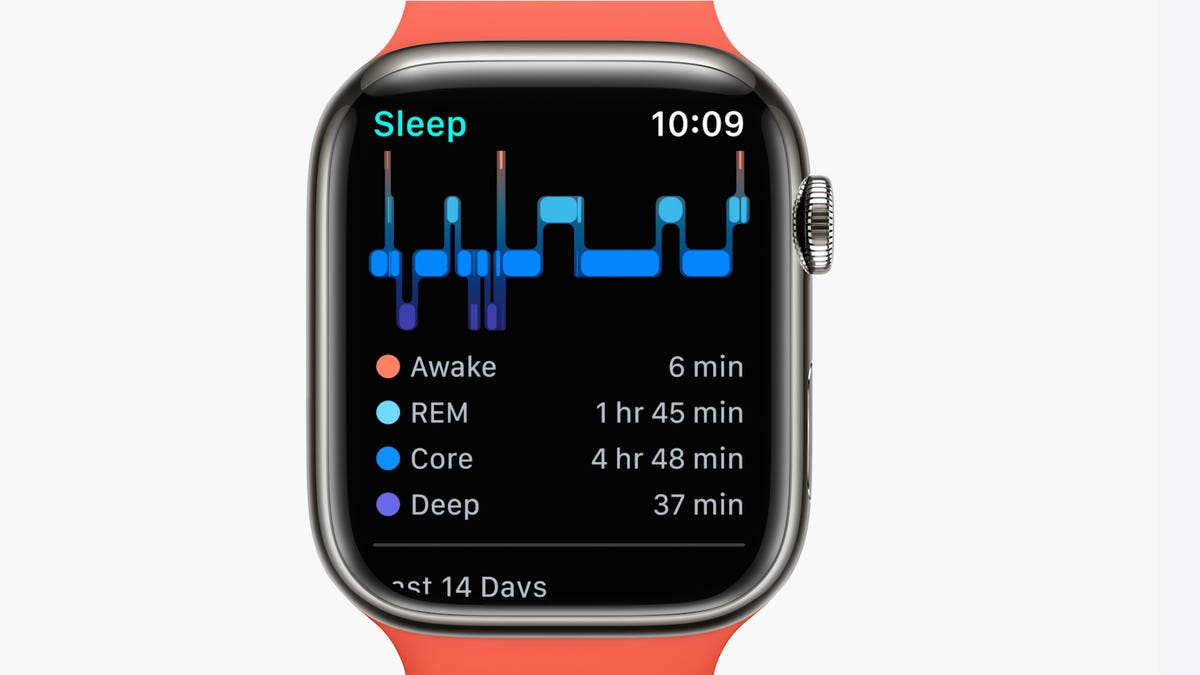Apple WatchOS 9's New Features Include Sleep Tracking, Medication Reminders
WatchOS 9 can detect REM, core and deep sleep, as well as offer heart health support and prompt you to take meds.

An example of Sleep Stages.
The Apple Watch hasn't been a great sleep tracker, but Apple is changing that with WatchOS 9.
Announced Monday at Apple's Worldwide Developers Conference, the watch's operating system will get an upgrade that tracks sleep stages to show you how much deep sleep you're getting and how often you wake up at night. Sleep tracking improvements are just one of a few new health features arriving on Apple Watch later this year, when the update will be available to everyone.
Sleep Stages
Currently, your Apple Watch can really only offer an estimation of the number of hours you've slept. Now, it's going a step further to show you precisely how long you were asleep and the amount of time you spent in each stage of sleep -- awake, REM, core and deep -- using data from the watch's accelerometer and heart rate sensor and some machine learning. Apple said it trained its machine learning with polysomnography, the standard method of tracking sleep in clinical sleep studies.
When you wake up, you can see a graph of sleep time and your sleep stages on the Apple Watch. If you want to dive deeper, you'll also be able to see detailed sleep reports with heart rate and respiratory rate data in the Health app on iPhone.
Many other wearables, including Fitbits devices, Garmin devices and the Whoop band, have been tracking your sleep stages for years now. But this will be the first time Apple is doing it.
See also
Medication tracking
The App Store is full of medication reminder and tracking apps, but Apple is about to make them obsolete with its new Medication app, available both on the Apple Watch and iPhone.
Within the forthcoming app, you'll be able to select any medication you take, both those you take daily and those that are occasional. That includes prescriptions, vitamins and supplements. All you have to do is type in the medications you take or scan a prescription label with the camera. Once your list of medications is set up, you can log when you take them and can schedule reminders so you don't forget.
Apple will also tell you if there are any critical interactions, either between your medications or with your meds and other substances, like alcohol.
Heart health updates
The Apple Watch has been able to detect atrial fibrillation for a few years now, with the ECG app and irregular rhythm notification. For folks with chronic atrial fibrillation, the Apple Watch will soon help you keep tabs on your condition via AFib History, a new feature that tracks how many times each day that your heart is in AFib and gathers insights on how often it happens and when it occurs the most.
With the AFib History turned on, you'll also get weekly notifications about your heart's activity. You'll also be able to see a detailed history of episodes in the Health app, along with insights about lifestyle factors that may influence atrial fibrillation, like sleep, alcohol consumption and exercise. You can download reports with this data that you can share with your doctor. The feature is FDA cleared for people ages 22 years and older who have been diagnosed with atrial fibrillation.
More from Apple's WWDC Keynote
- WWDC 2022: iOS 16, MacBook Air and Everything Apple Announced
- Apple Reveals 2022 MacBook Air With M2 Chip
- iOS 16 for the iPhone Debuts at WWDC 2022
- Delete and Edit Messages in iOS 16
- Apple Maps Gets a Makeover
- Safety Check for People Facing Domestic Violence
- Apple Wallet Upgrades From WWDC 2022
- Next-Generation Apple CarPlay Previewed at WWDC 2022

